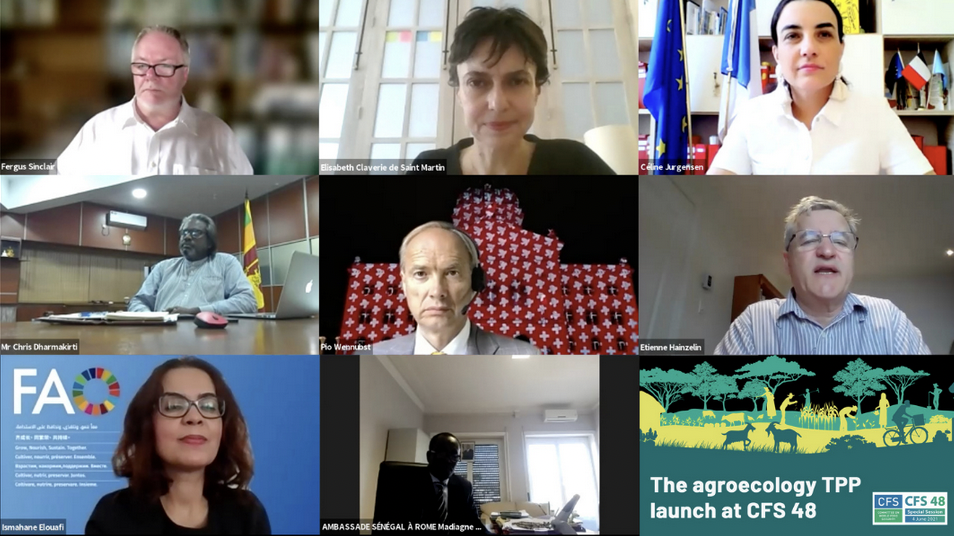Date:3 June, 2021
The CFS48 side event on addressing knowledge and implementation gaps constraining agroecological transitions featured discussion on the political demand for agroecological transformation, and publicly launched the Transformative Partnership Platform (TPP) as a response.
The TPP is a partnership, and this event served to raise awareness about the need for agroecological transitions, and expand the partnerships constituting the TPP, that are making such transitions happen. The opening address by His Excellency, President Gotabaya Rajapaksa announced a bold initiative for Sri Lanka to follow a national agroecological transition to improve the health and wellbeing of its people, starting with a ban on the importation of harmful agrochemicals. He concluded with a global call to action for nations and international bodies to address climate change and transform food systems to make them sustainable. The next day at the CFS Plenary, a recording of the President’s address opened the national statements following adoption of policy recommendations based on the HLPE (2019) report on agroecology and other innovations.
[Embed President’s address: https://www.youtube.com/watch?v=i_SR7G_7c_I ]
During the event, the President of Sri Lanka, Gotabaya Rajapaksa, announced its nation’s resolute policy action banning the import of all artificial fertilizers and agrochemicals in the country.
The TPP is guided by the agroecological principles set out in the HLPE (2019) report and is at the forefront of implementing the policy recommendations adopted by CFS based upon it. The position of the TPP as an important new way of working on agroecology was highlighted by a number of speakers. Céline Jurgensen, Ambassador and Permanent Representative of France to the FAO, said, “For us, agroecology is a central lever to transform food systems.” Pio Wennubst, Ambassador and Permanent Mission of Switzerland to the UN in Rome, indicated that, “The Transformative Partnership Platform, is a very valuable initiative because this is exactly what we need at this moment. We need to find new kinds of spaces, of structures to exchange among interested practitioners in the world, and we need to work and be focused on long-term perspectives.”
Speakers from Sénégal, Paraguay and Kenya spoke of making the shift to employing agroecological principles as well as the challenges, including the need to strengthen local innovation, to respect and build upon local and indigenous knowledge and to close the many information gaps from science to practice.
With over 450 participants across more than 50 countries, the side event spread awareness about both agroecology more generally and the TPP specifically, helping to build greater coherence in the debate around agroecology as a key response to global challenges. At the CFS Plenary, International Fund for Agricultural Development (IFAD) Vice President Dominik Ziller, speaking on behalf of the IFAD President, described the HLPE agroecology report as an essential reference to those seeking to meet the SDGs. The TPP is at the centre of this effort, bringing evidence to bear to inform science, practice and social movements driving agroecological transitions.
The TPP partnership comprises a core group of institutions that include the CGIAR, FAO, UNEP, IFAD, Biovision, TMG, AFA, AFSA, EU-INTPA, SDC and France (CIRAD, IRD and INRAE). It has a secretariat hosted at World Agroforestry (ICRAF), supported by the CGIAR research programme on Forests, Trees and Agroforestry (FTA) and the French Republic.
Partner News:
FTA: http://bit.ly/AgEc_webstory
CIRAD: https://bit.ly/3wy2ObE
UNEP: https://bit.ly/3guIL8m
Videos:
Event recording: https://www.youtube.com/watch?v=CGrH0tvXsQs
President Rajapaksa’s Address: https://www.youtube.com/watch?v=i_SR7G_7c_I

